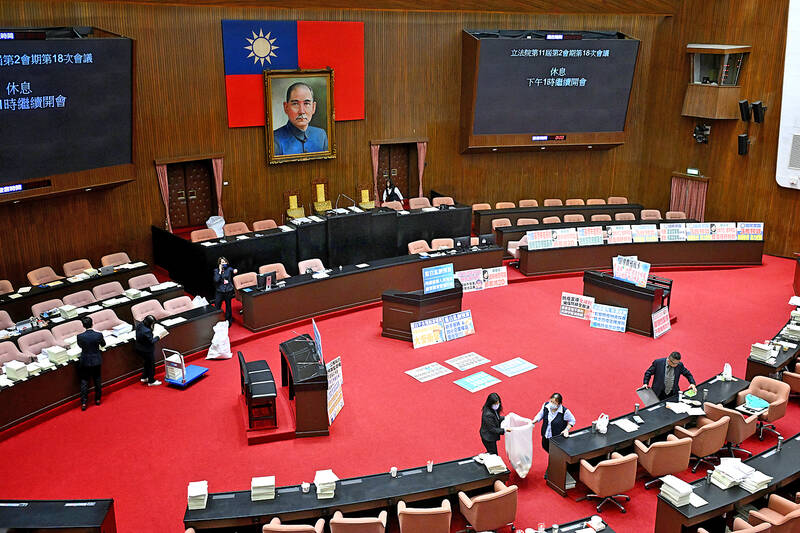The greatest threat to national security is the legislature, as lawmakers have the greatest access to confidential material with the fewest safeguards, Democratic Progressive Party (DPP) Legislator Wang Ting-yu (王定宇) said, calling for greater security protections through legislation.
DPP lawmakers including Wang are pushing for amendments to national security laws in the new legislative session.
“The Legislative Yuan itself is the biggest” weak point for national security, DPP Legislator Wang Ting-yu (王定宇) said in a recent interview about his concerns for the upcoming session.

Photo: Chen Yi-kuan, Taipei Times
Legislators have access to sensitive information, yet are subject to few restrictions, a major loophole that needs closing, he said.
Compared with European nations or the US, Taiwan lacks strict standards when it comes to lawmakers’ behavior, he added.
Regarding donations through social media platforms, Wang said that although laws prohibit legislators from accepting funds from the Chinese Communist Party (CCP), it is impossible to verify where money comes from if it is routed through an online service such as YouTube.
The legislature could require that all donations over a certain amount be reported, or the questions of who and where such funds are coming from would remain unknown, he said.
The Political Donations Act (政治獻金法) needs to be amended, as there are still too many ways for foreign funds to enter Taiwan, DPP Legislator Puma Shen (沈伯洋) said, but added that bipartisan consensus on the issue would be difficult to reach.
Wang also voiced concerns over people wearing Chinese People’s Liberation Army uniforms and pledging allegiance to China, saying that lawmakers should clarify penalties for doing so.
On the issue of legislators traveling to China, Shen’s proposed amendments to the Act Governing Relations Between the People of the Taiwan Area and the Mainland Area (臺灣地區與大陸地區人民關係條例) have been blocked by the Chinese Nationalist Party (KMT) and Taiwan People’s Party (TPP) 30 times, he said.
Nobody knows what lawmakers discuss when they go to China or meet with CCP officials in other locations, he said.
The KMT and TPP nominating Chinese immigrants to serve as lawmakers merits immediate legislative regulation, Shen said, adding that China’s “gray zone” warfare tactics might also require legislative changes to address.
Too many Taiwanese have close ties to China, and the scope of what is legally considered treason is too narrow, he said.
“What I now fear the most is [KMT caucus whip] Fu Kun-chi (傅?萁) bringing half of their lawmakers to China saying they want to sign a peace agreement. That would be the end of Taiwan,” Shen said.
He also cited maritime regulations as an area in which increasing criminal punishments might not be an effective solution, saying that the government could expand enforcement to allow the coast guard more authority to detain ships.
However, as long as the KMT and TPP maintain their majority, it would be difficult to pass such amendments, Wang said.

Taiwan is stepping up plans to create self-sufficient supply chains for combat drones and increase foreign orders from the US to counter China’s numerical superiority, a defense official said on Saturday. Commenting on condition of anonymity, the official said the nation’s armed forces are in agreement with US Admiral Samuel Paparo’s assessment that Taiwan’s military must be prepared to turn the nation’s waters into a “hellscape” for the Chinese People’s Liberation Army (PLA). Paparo, the commander of the US Indo-Pacific Command, reiterated the concept during a Congressional hearing in Washington on Wednesday. He first coined the term in a security conference last

A magnitude 4.3 earthquake struck eastern Taiwan's Hualien County at 8:31am today, according to the Central Weather Administration (CWA). The epicenter of the temblor was located in Hualien County, about 70.3 kilometers south southwest of Hualien County Hall, at a depth of 23.2km, according to the administration. There were no immediate reports of damage resulting from the quake. The earthquake's intensity, which gauges the actual effect of a temblor, was highest in Taitung County, where it measured 3 on Taiwan's 7-tier intensity scale. The quake also measured an intensity of 2 in Hualien and Nantou counties, the CWA said.

The Overseas Community Affairs Council (OCAC) yesterday announced a fundraising campaign to support survivors of the magnitude 7.7 earthquake that struck Myanmar on March 28, with two prayer events scheduled in Taipei and Taichung later this week. “While initial rescue operations have concluded [in Myanmar], many survivors are now facing increasingly difficult living conditions,” OCAC Minister Hsu Chia-ching (徐佳青) told a news conference in Taipei. The fundraising campaign, which runs through May 31, is focused on supporting the reconstruction of damaged overseas compatriot schools, assisting students from Myanmar in Taiwan, and providing essential items, such as drinking water, food and medical supplies,

New Party Deputy Secretary-General You Chih-pin (游智彬) this morning went to the National Immigration Agency (NIA) to “turn himself in” after being notified that he had failed to provide proof of having renounced his Chinese household registration. He was one of more than 10,000 naturalized Taiwanese citizens from China who were informed by the NIA that their Taiwanese citizenship might be revoked if they fail to provide the proof in three months, people familiar with the matter said. You said he has proof that he had renounced his Chinese household registration and demanded the NIA provide proof that he still had Chinese